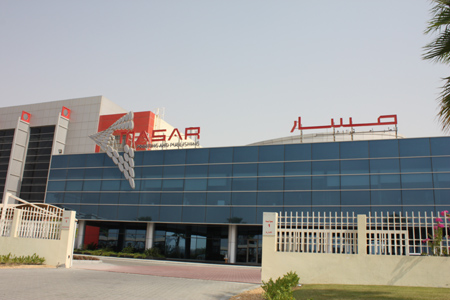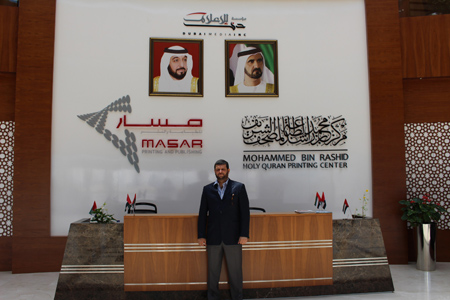 Interview with Mr Samer Sabri Abdel Qader, Director - Pre-Press & Digital, Masar Printing and Publishing
Interview with Mr Samer Sabri Abdel Qader, Director - Pre-Press & Digital, Masar Printing and Publishing
Masar has a great deal of experience in printing. How and why did it all begin, from Arab Media Group (AMG) to Dubai Media Incorporated (DMI) –Masar? How did that whole thing happen?
It was an expansion – a natural expansion following increased printing requirements. In 2005, there was a decision to expand Al Bayan's printing capacity, which included two tabloid-sized newspapers, Emirates 24/7 and Emarat Al Youm. At the time we were in a different location. Because of the new Arabian Canal project, we knew we had to relocate our facility to the International Media Production Zone (IMPZ), and the idea of Masar was born. Masar was built to be the leading high-tech printer in the region.
How has the printing industry changed since you entered the business?
This is a very good question. I think the industry has evolved and revolutionised itself to adapt to the technological changes that pose challenges to the industry, namely the Internet, and how people consume information. Sometimes, we react emotionally to these challenges – sometimes in extreme ways – and we worry about the present and future of the printing industry. People predicted at one time that the print industry would drastically lose market share to other media. Needless to say, this has not happened and instead, the industry has transformed to meet the new market realities.
So, what we're seeing today is a natural change and I think it's moving in a positive direction. The outlook is not as negative as it was perceived to be at the very beginning of the global financial crisis. Okay, the number of traditional titles and pages within them may have dropped; however, overall, we've seen printing technology evolve so that it's now leading a new wave of services that has increased our need to expand and invest in new capacity and technology. Hence, we are looking to expand our current facility to meet these new opportunities.
And, as with any other industry, it's all about supply and demand in the marketplace. When I attended the World Printers Forum in Amsterdam (held between the 13th and 15th of October), I heard some interesting statistics. For instance, the total number of people around the world who read printed newspapers has increased by 3%, and now stands at three times the number of online readers. This reality puts the onus on us and our partners in the industry to deal with the situation. We have to innovate and create new ways of keeping our users engaged, while at the same time not clashing with current realities. I look at the developments that are being made by the big players in the printing industry; I look at the investments they are putting into new technology, into research and development, and at the new printing machines being designed. We are now looking at personalising content based on user preferences in a printed format. These are positive trends.
 You have a long-term relationship with Kodak and use a raft of Kodak products. Why Kodak?
You have a long-term relationship with Kodak and use a raft of Kodak products. Why Kodak?
With Kodak we have developed a very solid relationship. At the end of the day, when you decide to go in a certain strategic direction, it's not just one fact that will sway your decision, it's a whole experience. At one time we even had a Kodak engineer based at our facility. Not a lot of companies would provide such support.
DMI is the first company in EAMER to purchase a KODAK PROSPER 6000C Press. Why have you chosen a PROSPER 6000C Press? What strategic considerations led you to this purchase?
When you want to invest, you have to look to the future. The Prosper 6000C is a product we have been waiting for. We've had some challenges, some limitations in the industry. Anyone who knows the business knows what these challenges are: productivity, quality and cost. We'd been looking at this project since 2007 and we wanted a solution for these challenges. The Prosper 6000C can do 300 meters per minute, which is faster than the fastest conventional sheet-fed machines.
Another important factor was the move from SRA3 to B2 and 64 centimeter width sheets. This is very interesting for a commercial printer. You are giving me 16 pages, which goes perfectly with my high-capacity finishing. In addition, the break-even point is getting better and better now.
When productivity is high, consumers get the product at a more reasonable price, so the cost of production is more reasonable, especially with short-print runs, which form the bulk of the business in our region. The Kodak Prosper digital printers can compete with offset machine costs up to the 3,000 copies print run threshold, and with the added value elements of personalisation, less waste and it being better for the environment, also without going through the unnecessary steps of plate preparation, the Kodak Prosper 6000C became very appealing to us. This solution differentiates us from our competitors in the market.
You mention that this purchase puts DMI in an ideal position to support Dubai's vision of becoming a smart city. Tell us more about this vision, and how Kodak's technology will enable DMI to lead the change to become a smart city.
Well, communications is one of the six pillars announced by His Highness Sheikh Mohammed bin Rashid Al Maktoum that will transform Dubai into a smart city and we are very involved in making this vision a reality. Being a smart city entails giving residents and citizens what they need to live and work in the modern era. The key is to show people what can be achieved, what is possible. I remember a comment made by Steve Jobs about making people realise what they want by showing it to them. This is very clever and shows how innovative minds continually push the boundaries. This is what we have to do. So, you have to bring people into the dream.
This is the way we are trying to think – to put ourselves into the shoes of the consumer, the user, and see how we can make our printing services more relevant and valuable to our stakeholders.
Where does the future lie for the printing industry in the UAE, and how will DMI's innovative approaches keep the country's printing sector ahead of the competition in neighbouring regions?
Sometimes, you enjoy holding a printed newspaper and reading it. But, maybe this behaviour will change in a generation or two. So in the meantime, we have to be smart. We have to be creative about new applications. The main idea is to eliminate unneeded printed quantities. I look at myself; how I read a newspaper. Immediately when I receive it, I remove some parts from the newspaper. I put them aside and never look at them. I don't want them. I am not into classifieds. I am not looking to shop for anything. I don't read everything. Most people only read the headlines. This to me is wasteful.
Depending upon varying interests and preferences, subscribers would receive a complete, personalized printed newspaper; similar to an online product where you consume information based on your preferences. And constantly personalizing products gives more added value to the advertiser as well. This allows more targeted marketing and a higher response rate, which better justifies advertising spend in print. Advertisers only pay for markets that are relevant to their audiences. This is of big value.
We are not saying, however, that we are going to stop printing conventional newspapers; conventional newspapers will stay. I was asked this question by a journalist and she said, 'why should I get fewer pages?'. I replied, 'it's your decision!'. You will get it in fewer pages if you choose to, but the idea is to create a new medium for new markets that will complement conventional newspapers. We are looking to add more value, to expand the audience, to be able to address more people, but in different ways. We can create a new channel of communications that is just for you. It can feature your favourite writers, your favourite stories. If you travel, your content can follow you. When you come to Dubai for tourism, your newspaper, in your room, will contain your preferred content.
That is the future we see.
This type of evolution is nothing new to us here in Dubai. People around us expect Dubai to lead development. We will disappoint them if we don't.
And as a leader in the industry, do you see that others will follow you?
We are sure. Either you lead or you will be following somebody else. We are not inventing something new; we are investing in a new vision, a certain technology. I believe that Masar is taking the lead and this is not new for us. It has happened several times, where we, for example, started FM printing in the region. At that time, I remember some experts in the industry telling me that that was the wrong direction to go in. 'Why newspaper FM screening?', they would say. 'What are you trying to do?' Well, today all newspapers are printed using this technology. We like to distinguish ourselves by always giving more value to our clients.
On the other hand, we as a business have to keep up with change. You cannot always invest in 100%-guaranteed ventures. You cannot be creative, you will not be able to grow and develop yourself, unless you take some initiative. So, again, we are not changing the industry, we are adding to it. We think that this is the right direction. We think that this is the future. There is no further development in the conventional market. By the time our business model becomes complete, technology will have already evolved. Markets continually evolve. This is natural.
But this ambition, to continually explore and create new value, is in our DNA. We are always looking to challenge ourselves to innovate and take calculated risks.
So, if we can drill down a little bit more into the opportunities and benefits of the Proper 6000C other than the personalization; you quickly touched on the cost, and on the efficiency. So if you can talk to us a bit more about these benefits.
Apart from the personalisation, the new opportunities that the KODAK PROSPER 6000C Press opens up for us are, for example, in direct mail, book printing, advertising, and newspaper printing. Also, better management of print runs with more flexible requirements and processes. With the Prosper, you can print a few copies and then add more at a later stage. You only print what you need. This is a big added value for us and for our clients.
The Prosper also opens up new business opportunities across multiple sectors, like education, for example. The ability to customise mass printed applications for educational curricula is a huge opportunity. Such benefits will also create new opportunities for publishers and advertisers to become more creative and to better target their audiences. It gives them opportunities to increase their revenues with more targeted solutions.




